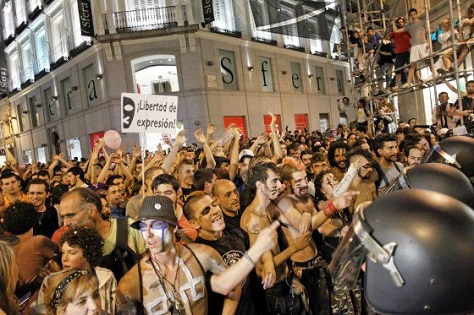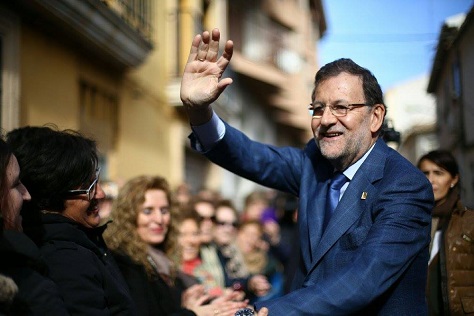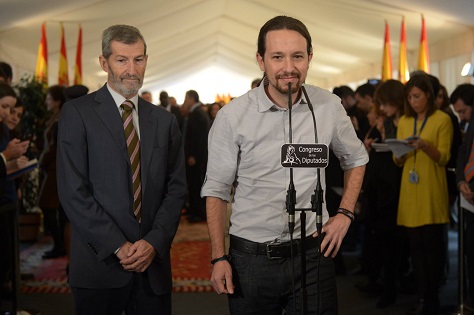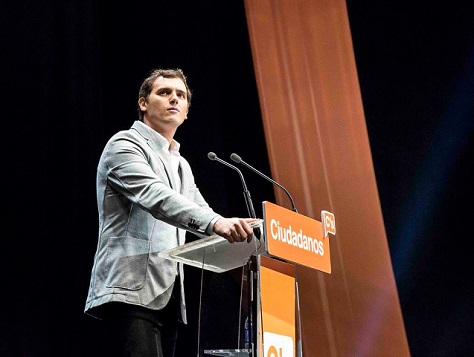
Five days before the Christmas holiday, Spanish voters will go to the polls to choose a new government in an election that’s being hailed as the country’s most important since 1982.![]()
Indeed, voter turnout may well exceed the 80% levels not seen since 1982, when Spain had only just emerged from its Francoist dictatorship and was four years away from joining the European Economic Community, the predecessor to today’s European Union. Moreover, it will also be the first general election to take place under Felipe VI, whose father Juan Carlos I abdicated in June 2014 after guiding the country’s transition to democracy in the mid-1970s.
But what makes the December 20 election so unique is that economic crisis has shattered Spain’s stable two-party electoral tradition, leaving a four-way free-for-all that could force unwieldy coalitions or a minority government at a time when the country has only just started its economic recovery. Distrust in both major parties, moreover, has opened the way for a popular far-left movement at the national level and greater discord at the regional level, most notably in Catalonia, where support for the independence movement is growing. No matter who wins power in the eurozone’s fourth-largest economy, the next Spanish government will face difficult decisions about GDP growth, lingering unemployment, and federalism and possible constitutional change.
For decades, Spanish elections were essentially, at the national level, a fight between the conservative Partido Popular (PP, the People’s Party) and the center-left Partido Socialista Obrero Español (PSOE, Spanish Socialist Workers’ Party). In the most recent 2011 election, the PP won 186 seats in the 350-member Congreso de los Diputados (Congress of Deputies), the Spanish parliament’s lower house, while the PSOE won 110 seats.
Both parties can point to massive successes over the past three decades. Under longtime PSOE prime minister Felipe González, Spain consolidated its liberal democracy and benefited greatly from closer economic and financial ties to Europe, while Barcelona’s emergence as the host of the 1992 Summer Olympics catapulted it into a world-class city. Under conservative prime minister José María Aznar, Spain joined the core of western European countries as a founding member of the eurozone in 2002 and developed widening security ties with the United States. When the PSOE returned to power in 2004 under José Luis Rodríguez Zapatero, the government enacted same-sex marriage in 2005 and later negotiated a peaceful ceasefire with the paramilitary Basque nationalist group Euskadi Ta Askatasuna (ETA).
The pain in Spain

But the global financial crisis of 2008-09 and subsequent eurozone crisis of 2010 knocked Spain off its pedestal.
Not unlike Florida, Nevada and parts of California in the United States, property values in Spain fell as rapidly as they once climbed, and an economy driven by construction and easy credit sputtered to near-depression levels of contraction. Despite running a more parsimonious fiscal policy in the 2000s than even Germany, Zapatero’s government soon found its expenses far exceeding revenues, and his government engaged in a series of tax increases and spending cuts.
The Spanish electorate ousted Zapatero in December 2011, ushering the People’s Party back to power under Mariano Rajoy, whose main goal was to prevent Spain from needing to seek an emergency bailout. Despite some scares over the Spanish banking system in 2012, Rajoy succeeded in keeping Spain bailout-free, but at the cost of ever greater spending cuts and tax hikes. The Rajoy government’s tough fiscal medicine, to some degree, has worked. Yields on Spanish 10-year debt have steadily fallen from a high of over 7.2% in July 2012 to less than 1.8% today. For a country without economic expansion since 2008, the Spanish economy returned to fragile growth in 2014, and it maintained growth throughout 2015 — notching 1% growth in the second quarter of this year and 0.8% in the third.
But voters are not enthusiastic about the prospects of reelecting Rajoy, a leader who never quite managed to win over Spanish hearts. Spain’s unemployment rate today is still 21.2%, a drop from the record-high 26.9% level recorded in early 2013. But that’s still a far higher jobless rate than anywhere else in the European Union (with the exception of Greece).
In the 2008 election, before the bottom fell out of the Spanish economy, the two major parties together won 83.8% of the vote. By 2011, that percentage fell to 73.4%. If polls are correct, that percentage could fall below 50% on Sunday, as both the PP and the PSOE struggle against the surging popularity of the anti-austerity Podemos (‘We can’) on the left and the liberal, federalist Ciudadanos (C’s, Citizens) on the right.
If the election were held today, the PP would win around 110 seats, the PSOE around 90, and Podemos and Ciudadanos would each win around 60, leaving none of them with a clear majority. The uncertainty of the four-way race has both energized the electorate (in a manner reminiscent to those first early elections in the post-dictatorship era) and enhanced the chances of post-election uncertainty that both Greece and Portugal have endured this year.
People’s Party: conservatives aiming for a second term

There’s no disputing that Rajoy’s government has steered Spain to better economic conditions today than the country faced four years ago, but it’s hard to imagine how Rajoy could have left the economy any worse than it was in 2011. Too often, Rajoy’s government pursued economic policies that cut social welfare programs in a way that seemed to lack compassion for the real suffering of everyday Spaniards. Spanish finance minister Luis de Guindos, with Germany’s blessing, was once a lock to lead the Eurogroup, the finance ministers who together form eurozone’s informal economic policymaking body. He lost out to the sitting chair, Dutch finance minister Jeroen Dijsselbloem, partly because no one knew whether he would be a finance minister long enough to fulfill his duties.
Even on the campaign trail Wednesday, an angry teenager in Rajoy’s home region of Galicia punched the prime minister in the face.
Millions of Spanish voters, especially young voters who have struggled most with staggering unemployment rates, probably wished they too could have taken a pop at Rajoy. He’s never been a popular figure — elected as the PP’s leader in 2004 at the beginning of the Zapatero era, he flubbed the 2008 election and it took an economic crisis to bring him to power in 2011. He’s much older, by almost a quarter-century, than his three major rivals, which highlights his old-fashioned and stiffer approach to public discourse.
Critics would also charge that his government feels so retro due to its approach to social policy. Assuaging the right wing of his own party, Rajoy has embraced socially conservative positions with enthusiasm, including support for the cultural tradition of Spanish bullfighting. Rajoy also made a push in 2014 to roll back the liberal abortion laws that Zapatero introduced a decade ago. That attempt failed miserably, forcing justice minister Alberto Ruiz-Gallardón to resign. Corruption scandals, implicating the party’s former treasurer Luis Bárcenas and other figures, have lessened faith in his government’s ability. Earlier this week, Spain’s ambassador to India, Gustavo de Arístegui, resigned after accusations of accepting kickbacks. Rajoy’s ham-fisted approach to the Catalan independence movement and his refusal to countenance more federalism in Spain have exacerbated Madrid’s relationship with the regions.
Though polls give the PP a narrow lead among Spain’s four parties, those same polls do not give the party much hope for the kind of absolute victory it achieved in 2011. If, as expected, it emerges as the party with the greatest number of seats, it will have three unpalatable options if it wants to remain in power: a minority government (that will likely lead to early elections in 2016), a difficult coalition with the upstart Ciudadanos or an even more difficult ‘grand coalition’ with the PSOE. All three options are essentially uncharted territory for both the party and for Spain. (The fourth option, a three-way coalition among the other parties, remains even more outlandish, though it mirrors the three-party government that recently came to power in neighboring Portugal).
PSOE: Trying to make a break with its past support for austerity

The PSOE’s problem is that, for too long, it allowed itself to become lumped alongside the PP as a force of austerity in Spanish politics, guilty of exacerbating the employment crisis and economic misery throughout the country. For nearly three years, its general-secretary Alfredo Pérez Rubalcaba, a grey centrist, led the party toward ever greater timidity. He resigned only after the PSOE’s horrible showing in the May 2014 European parliamentary elections.
His successor, Pedro Sánchez, is a youthful, moderate economist who has tried to draw a brighter contrast against Rajoy. Elected to the Chamber of Deputies for the first time in 2009, Sánchez represents Madrid, where he served as a city councillor for five years. He only narrowly defeated the more experienced (though younger) Eduardo Madina, a Basque federalist, to win the party’s leadership, though more popular figures, like Andalusia’s regional president Susana Díaz, decided not to run. If he loses Sunday’s election, he would have a difficult time surviving a challenge from Díaz, who has since won reelection in Andalusia, a longtime PSOE stronghold, or the popular former defense secretary, Carme Chacón.
The PSOE, for all its social policy victories in the 2000s, is still tarred with the bad luck of having been in power when the crisis began and is held responsible for beginning Spain’s crippling cycle of austerity, forcing many leftist voters to Podemos. Nevertheless, in Monday night’s one-on-one debate with Rajoy, Sánchez vociferously attacked the prime minister’s record on corruption, at times arguing that Rajoy was a liar and that he was not a ‘decent’ person. Despite his efforts to unite the anti-Rajoy forces, Sánchez remains an inexperienced politician who has struggled to win over an electorate that has become disenchanted with mainstream politics and both parties.
Podemos: Giving a voice to Spain’s ‘indignados’

For its part, the rise of Podemos in mid-2014 was the first sign that Spain’s two-party system was collapsing. Emerging out of the indigados movement that took to the streets as early as 2011 in opposition to the frightful economic conditions that so quickly left many Spaniards out of work — and out of dignity, it harshly criticized both parties that had become tainted with austerity.
Podemos came into existence only in February 2014, under the leadership of Pablo Iglesias, a 37-year-old academic, and it quickly gained traction in the May 2014 European elections (it elected five MEPs). By January 2015, it was either leading public opinion surveys or tied with the PP in those surveys.
Ironically, Iglesias and Podemos filled a vacuum that might have been filled by Alberto Garzón, the charismatic leader of the far-left Izquierda Unida (IU, United Left), a leftist coalition that incorporates the Partido Comunista de España (PCE, Communist Party of Spain). The Spanish left’s ongoing tripartite fragmentation might easily contribute to the reelection of a Rajoy government, however weakened.
Earlier this year, adversaries quickly pointed to the troubles of Greece’s radical-left SYRIZA government and its prime minister, Alexis Tsipras, arguing that a Podemos-led government in Spain might result in equally destabilizing economic chaos. The criticisms worked, and by the autumn, Podemos had tumbled from 25% support, tied for first place, to around 15%, languishing in fourth place.
More recently, in part due to Iglesias’s strong performance in a three-way debate in late November, Podemos‘s poll numbers have been on the rise. Since its plummeting support earlier this year, Iglesias and other leaders have moderated the movement’s policy stands, signaling that it would not make the same mistakes as Tsipras’s SYRIZA in Greece and gradually shifting from a radical socialist to a more social democratic approach to economic policy.
That, however, hasn’t stopped heavy-hitters, including González, the former prime minister, from reminding voters of Podemos‘s hard-left origins, tying the party not only to SYRIZA but to Venezuela’s hard-line socialist government and its founder, the late Hugo Chávez. Juan Carlos Monedero, one of the movement’s founders (who resigned earlier this year as Iglesias attempted to move Podemos closer to the political mainstream), once served as a consultant to Venezuela’s chavista government.
Ciudadanos: A liberal and federalist alternative — and kingmaker?

Perhaps the most tantalizing option for the Spanish electorate is Ciudadanos. Ironically, though Podemos was the first group to puncture the two-party tradition, it could easily be Ciudadanos that most benefits.
Starting as a regional movement in Catalonia in 2006, the party positioned itself as a social democratic, economically liberal and federalist option to the corrupt right-wing coalition that had governed Catalonia nearly exclusively in the democratic era and to the increasingly cross-ideological movement seeking Catalan independence.
In 2015, the party’s leader Albert Rivera, a 36-year-old who once posed naked on a poster to gain more attention to his party, decided to take his cause national as a less corrupt, socially liberal alternative to Rajoy’s PP, and he’s clawed his way into contention. Polls show that the party is vying for third place with Podemos, though there’s a chance that a last-minute surge of momentum could see the ‘C’s’ rise to second place.
Its leading economic adviser, Luis Garicano, wants to streamline Spain’s labor market and modernize its education system, all while flushing the government of its cronyism. Ciudadanos, like Podemos, represents a stark rupture with the mainstream. But it blends the most popular social policies of the PSOE with the economic prudence of the PP, all without either party’s documented corruption. With many voters still undecided, Ciudadanos has more upside potential than any of its three rivals. In Catalonia’s regional elections earlier this autumn, the party emerged as the chief federalist opposition, gaining nearly one-fifth of the vote and broadening its previously marginal support.
Even if his party falls short of its widest expectations, Rivera stands to become the most important leader in a hung parliament because it will almost certainly be up to him to decide whether Rajoy or Sánchez will enjoy support to govern — and for how long.